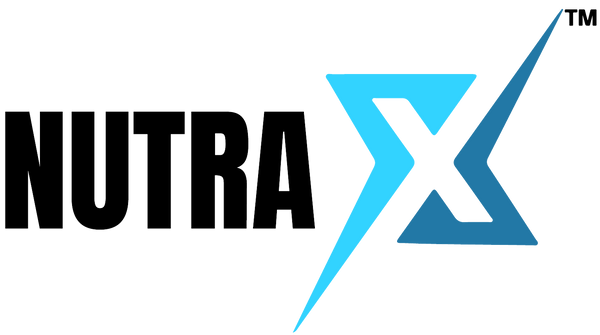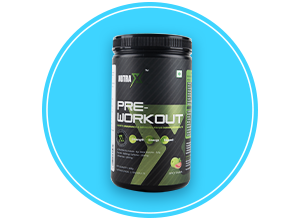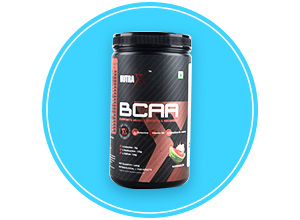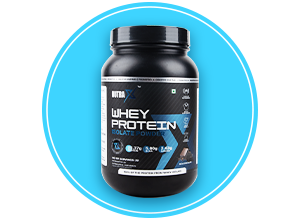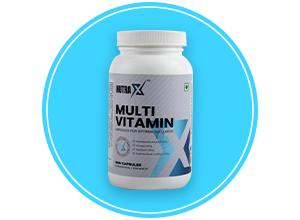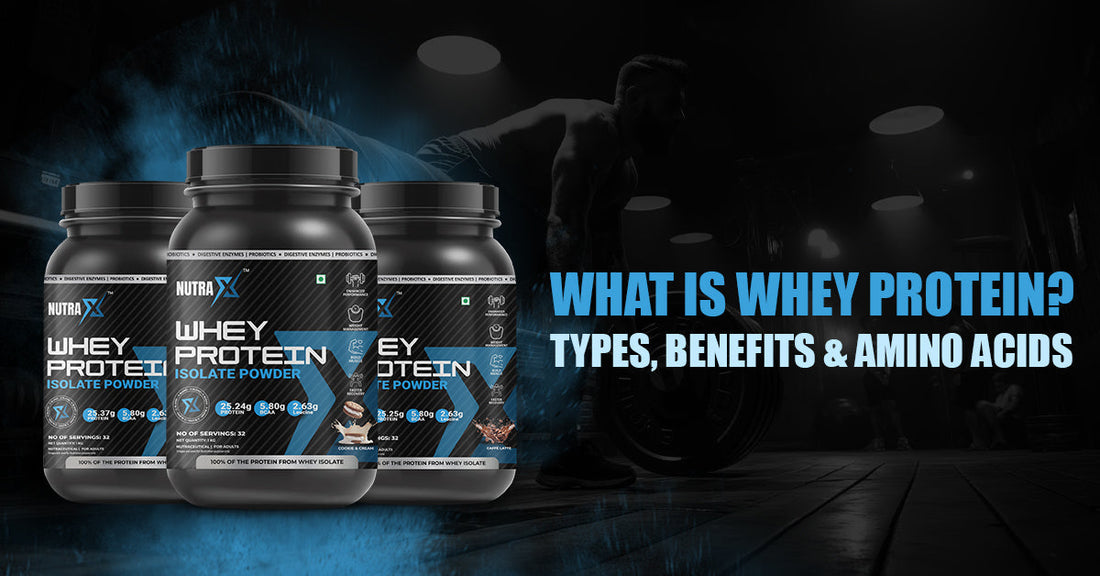
What is Whey Protein? | Types, Benefits & Amino Acid Breakdown
Share
Whey protein is a go-to supplement for fitness buffs and anyone trying to live a healthier life. But what is it, exactly? Is it safe for everyone? And with so many types out there, how do you choose?
Let’s clear things up so you can find the best option for your goals.
What is Whey Protein?
What is Whey?
Whey is the liquid that’s left after making cheese or paneer. It’s packed with protein, some lactose, and important vitamins.
What is Protein?
Protein is an essential nutrient. Your body relies on it to build and repair muscle, support your organs, and produce important enzymes and hormones.
So, What is Whey Protein?
Whey protein is just that nutritious liquid turned into a concentrated, easily mixable powder. It digests quickly and delivers top-notch protein, making it a favorite for workout recovery and daily nutrition.
Why is Whey Protein So Effective? It’s All About Amino Acids
A Complete Protein
Whey is what nutritionists call a “complete protein” because it contains all 9 essential amino acids, ones your body can’t make on its own.
The 9 Essential Amino Acids:
- Histidine
- Isoleucine
- Leucine
- Lysine
- Methionine
- Phenylalanine
- Threonine
- Tryptophan
- Valine
Why They Matter:
These amino acids help with:
- Muscle repair and growth
- Energy production
- Hormone and enzyme creation
- Strengthening immunity
Types of Whey Protein
Whey Protein Concentrate (WPC)
Contains about 70–80% protein, with some fat and lactose. It’s budget-friendly and perfect if you’re just starting out with supplements.
Whey Protein Isolate (WPI)
Purified even further, isolate has 90–95% protein and barely any fat or lactose. Great for those watching their carbs, lactose-intolerant folks, or anyone focused on lean muscle gain.
Whey Protein Hydrolysate (WPH)
“Pre-digested” so your body absorbs it lightning-fast. Most often used by pro athletes or for medical recovery when quick nutrition matters most.
So, Which One’s Best? Whey Concentrate, Isolate, or Hydrolysate
Let’s compare the three:
|
Feature |
Concentrate |
Isolate (Best) |
Hydrolysate |
|
Protein % |
70–80% |
90–95% |
80–90% |
|
Lactose |
Moderate |
Very Low |
Very Low |
|
Digestion |
Moderate |
Fast |
Fastest |
|
Price |
Affordable |
Mid-range |
Expensive |
|
Taste |
Creamy |
Neutral |
Bitter |
|
Ideal For |
Beginners |
Most users |
Athletes |
Winner: Whey Protein Isolate!
It’s pure, gentle on the stomach, and versatile, perfect for almost everyone, whether you’re starting your fitness journey or taking things to the next level.
You May Like to read "Whey Isolate vs Concentrate | Which Protein is Best for You?"
Key Benefits of Whey Protein
Speeds up muscle building and repair
- Boosts metabolism and helps with fat loss
- Curb hunger and manage your appetite
- Strengthens your immune system
- Convenient, high-quality nutrition on the go!
Are There Any Side Effects?
Possible Downsides:
- Some people may feel bloated or gassy (especially with concentrate or if sensitive to lactose)
- For those with kidney problems, large amounts aren’t recommended
Should You Still Use It?
Yes, for most healthy people! Used in the right amounts, especially isolate, it’s safe, effective, and fits right into a balanced diet.
How Much Whey Protein Should You Take?
- Most people benefit from 1.2 to 2.0 grams of protein per kg of body weight
- Typically, 1 scoop = about 20–25g protein
- The best time: Within 30 minutes after exercise
- Other ways: Blend into smoothies or oats, or use as a meal supplement
For More details checkout our Guide: NutraX Whey Protein Isolate Guide
How to Use Whey Protein Properly
- Shake it up with water or milk
- Add to smoothies, oats, or pancakes
- Make it part of your daily routine
- Pick isolate for the cleanest, fastest results
Final Take: Is Whey Protein Right for You?
Whey protein is a clinically supported supplement that contributes to improved muscle recovery, fat metabolism, and overall performance.
Among all the types, whey isolate stands out for its purity, digestibility, and flexibility for all kinds of users. Whether you’re working out, managing weight, or just need an energy boost, whey protein is a smart, reliable choice.
Your journey deserves the best fuel; choose wisely and enjoy stronger, healthier days ahead!
Let me know if you’d like this made even more conversational, or if you want it shortened for a certain use!
Remember: It’s not a shortcut or a steroid, but real nutrition that supports your progress.
FAQs:
Q: Is whey protein vegetarian?
A: Yes! Whey is made from milk, so it’s vegetarian-friendly.
Q: Can I use it daily?
A: Absolutely. Just stay within your protein needs.
Q: How is whey protein different from regular food protein?
A: Whey is digested faster and is really convenient, especially after a workout. But you still need whole foods; both work together to meet your protein needs.
You May Also Like to Read:
